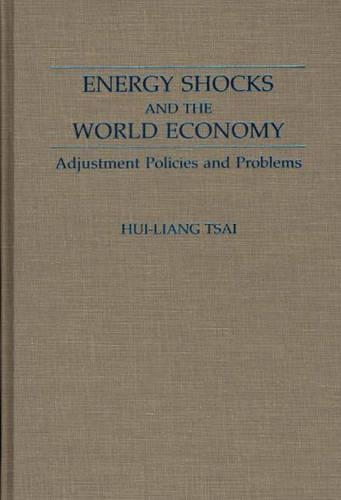
Energy Shocks and the World Economy: Adjustment Policies and Problems
(Hardback)
Publishing Details
Energy Shocks and the World Economy: Adjustment Policies and Problems
By (Author) Hui Liang Tsai
Bloomsbury Publishing PLC
Praeger Publishers Inc
25th September 1989
United States
Classifications
Tertiary Education
Non Fiction
Energy industries and utilities
338.436655
Physical Properties
Hardback
209
Description
The second of two works resulting from the author's study of energy and economy, this book examines the international macroeconomic aspects of energy adjustment. Specifically, the author analyzes the ways in which economies adjust to external shocks, particularly the oil price shock and other energy market changes of the 1970s and early 1980s. He seeks to put the recessions experienced by industrial countries during the last decade in historical and analytical perspective, arguing that with the increasing openness of the world economy, the effects of the domestic policies of the industrial economies are increasingly relevant to the economic prospects of developing coutries. He argues further that the apparent problems of the global economy during the post-1973 era - stagnant growth, inflation, the international debt crisis and rising protectionism - are in part the result of a deterioration in the economic performance of industrial countries. The author begins by examining the effects of the energy supply disturbances on the world economy. Subsequent chapters explore such issues as challenges to economic stabilization policy; the impact of external shocks on the economies of less developed countries, especially with regard to inflation and balance of payments problems; the relationship between energy markets and the international debt crisis. Finally, the author provides a theoretical framework for the international adjustment to energy shocks, focusing on flexible exchange-rate policy responses to exogenous shocks in the 1970s and the contribution of exchange rate misalignment to the international debt crisis of the 1980s.
Reviews
This well-written book . . . reports on how economies respond to external shocks by analyzing the adjustment experience of both developed and developing countries to oil-price and other international changes during the '70s and early '80s. It therefore puts recent economic and political events into historical and economic theoretical perspectives, observing the significantly increasing globalization of such phenomena as inflation, stagnation, debt crises, and--particularly--national protectionism. Topics such as flexible market economics, adjustment programs, and recycling of money flows are therefore discussed in some detail, as are differences among countries, especially the US, France, West Germany, and the UK, which, uniquely, became independent of oil imports thanks to North Sea production. The author states the post-1973 oil price jump as amounting to an annual transfer of about 2% of the gross domestic product of the industrialized countries to the oil producers. To avoid such future calamities, he suggests more serious economic coordination among governments, and particularly strenuous efforts of developing countries to restore financial stability. . . . Many statistical tables; good bibliography.-Choice
"This well-written book . . . reports on how economies respond to external shocks by analyzing the adjustment experience of both developed and developing countries to oil-price and other international changes during the '70s and early '80s. It therefore puts recent economic and political events into historical and economic theoretical perspectives, observing the significantly increasing globalization of such phenomena as inflation, stagnation, debt crises, and--particularly--national protectionism. Topics such as flexible market economics, adjustment programs, and recycling of money flows are therefore discussed in some detail, as are differences among countries, especially the US, France, West Germany, and the UK, which, uniquely, became independent of oil imports thanks to North Sea production. The author states the post-1973 oil price jump as amounting to an annual transfer of about 2% of the gross domestic product of the industrialized countries to the oil producers. To avoid such future calamities, he suggests more serious economic coordination among governments, and particularly strenuous efforts of developing countries to restore financial stability. . . . Many statistical tables; good bibliography."-Choice
Author Bio
HUI-LIANG TSAI is Research Associate at the Center for Yugoslav-American Studies, Research, and Exchanges at Florida State University, Tallahassee. He is the author of The Energy Illusion and Economic Stability (Praeger 1989).
